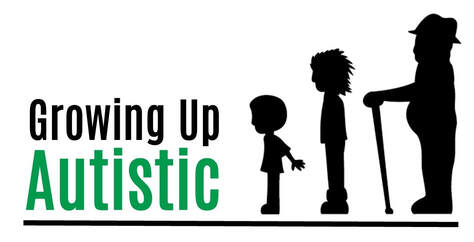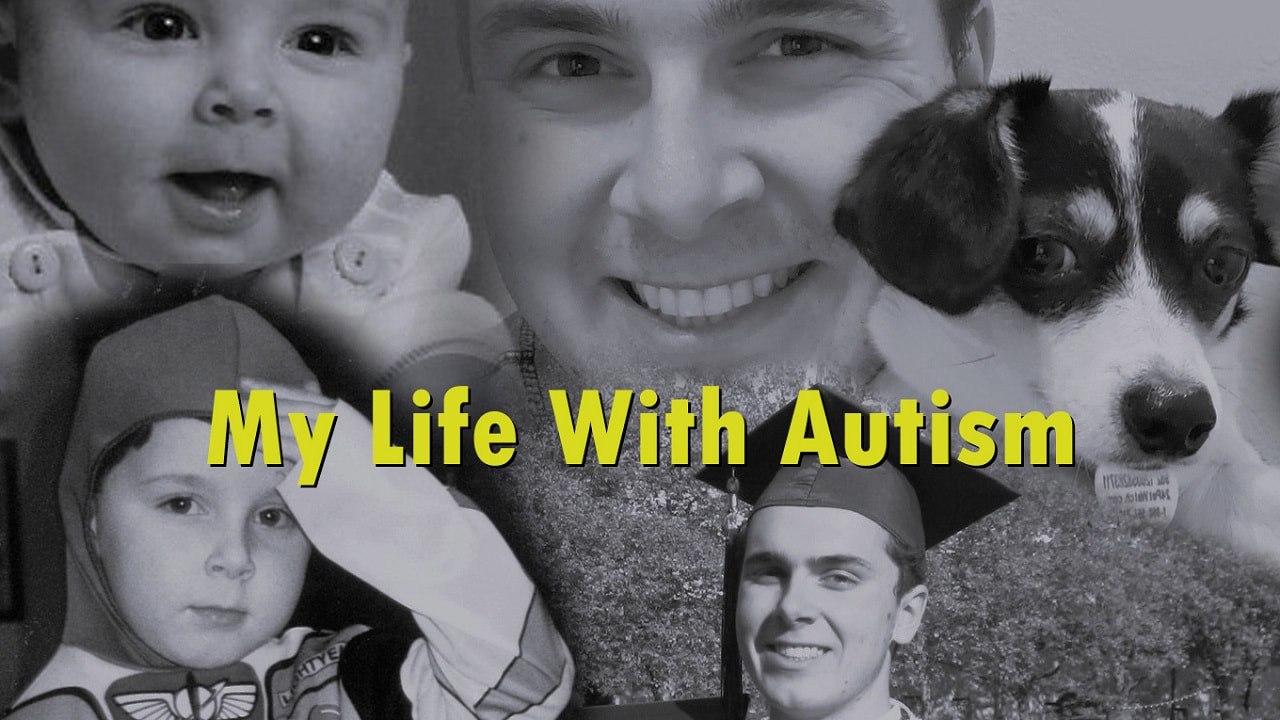|
Honest thoughts from 30-year-old Trevor Pacelli, adult with autism and author of What Movies Can Teach Us About Disabilities, Six-Word Lessons on Growing Up Autistic, and illustrator of The Kindergarten Adventures of Amazing Grace. See all of his books at TrevorPacelli.com I don’t want to be known as somebody with autism, I don‘t want to be known as autistic, I want to be known as just Trevor. Despite the "disability pride" stuff I see everywhere, I'm among the minority who hates my autism and wishes there was a cure; while my heavily organized mind and wild imagination are great bonuses, I would give that all up in a heartbeat to enjoy relationships the same as everybody else. Social Anxiety My anxiety most kicks in during social situations, even little ones like sudden small talk. If I pass by a stranger on a street and s/he says to me, "hi," I internally freak out because then I must abruptly transition out of my mind to say words. Part of that could come from stressful interactions I’ve had in trying to talk with people who have foreign accents and don’t speak English too well, it’s harder for me to understand them, and it only got harder during the COVID-19 mask mandate. It's equally as hard for me to look the other in the eye while I’m talking to them because knowing that they’re staring into my soul as I speak builds up inner pressure akin to that of stage fright. It makes sense for me that I have this problem considering my speech delay—while an idea may float around in my head, it takes longer for my tongue to adapt that image into words. My speech pattern mostly involves me pausing to come up with the right word until the other person just finishes my sentence for me, and when telling a story, the events would usually be told out of sequence. So if a stranger approached me for directions, I often say, "Sorry, I can’t help you" because of my incapacity to put my thoughts into words or even remember street names. Lately, my anxiety attacks have gotten to the point where I get one for no apparent reason and become physically unable to speak. One time, I retreated into the bathroom away from the social group I was in, and for around a half hour I fought against myself to walk back out—just reaching for the doorknob felt impossible because some invisible force kept pushing me back. Stimming The Merriam-Webster Dictionary definition of stimming: "Behavior that is marked by a repetitive action or movement of the body (such as repeatedly tapping on objects or the ears, snapping the fingers, blinking the eyes, rocking from side to side, or grunting) and is typically associated with certain conditions (such as autism spectrum disorder)." Usually, people who stim are unaware of their behavior unless someone else points it out to them, and I’m no exception as I do it constantly throughout the day. I may knock my knee, rock forward and back, wrap the hoodie string of my sweatshirt around my fingers, tear apart napkins and used coffee cups, repeat phrases to myself out loud, or flap my hands. The stims happen most often during the ever-so common event when a painful memory pops up in my head, and I make some random unexplainable lip and hand gestures to fight off the mental pain. You can imagine how I would always have difficulty sitting still or doing other things that require stillness, such as praying. Sensory Issues Besides talking, my autism also affects my sleep, to the point when a night of a full seven or eight hours of sleep is an extreme rarity. Often, if I'm on vacation, it takes hours to fall asleep, and I then wake up hours before the sun rises, especially if I have to sleep on the couch. It’s one of the reasons why travel is so anxiety-inducing for me; among the other reasons include the change in routine, weather, and time zone, not to mention being around people for hours on end. Camp was worse though; while vacations can be planned right down to the bathroom breaks, at camp, everything’s designed to be spontaneous. For the most part, camp leaders seldom ever tell the campers what to expect each day; one time, I along with the other boys were forced without warning to spend the whole night sleeping outside in a tent in the snow. It was supposed to be a lesson about the challenges we must take on as men, but I just kept panicking about how cold and numb I was and wanted so desperately to go home. Camp also forced us to stay up late and wake up early, and the games were all very physical and loud. Plus, the faraway locations of the camps often had extreme temperatures, and the buses transporting us always broke down, causing us to arrive many hours later than originally planned. (One time, the snow conditions were so bad that we had to stay at our campsite a full extra day as we waited for buses to arrive and drive us home.) So since most kids with autism find so much security in routine and predictability, a camp could be counterproductive to helping them grow. Special Interests I had several special interests growing up, some of which I’m not proud of for being transfixed onto. Those included:
As for Pokémon, did you know that its founder, Satoshi Tajiri, could be autistic? It would make sense because the series’ concept of exploring a fantasy world that one could customize with their team of cute little creatures has a lot of appeal to kids on the spectrum (and adults on the spectrum at that). Yet the franchise has been so near and dear to me after all this time mostly because I love to design my own Pokémon. That itself is an entire branch of fans in the Pokémon fandom, known as the “Fakémon” community, which furthermore gives me a sense of belonging somewhere. So I now run my own Fakémon Instagram account: @murro_region. High School Every time the teacher from any of my classes told the students to form groups for a project, I was that student who needed to have my team picked for me because everyone else already made their picks with their closest friends. When breaking into groups of two, I always ended up in a group of three, had to work with the teacher, or had to do the project by myself. This happened even if I had others from my social clique in my class who called me their friend. They would always save seats in advance for their much closer friends, and I would ask, "so where am I supposed to sit?" and they would then tell me, "you can sit anywhere you like." This meant I never got the privilege of getting to sit close to the ones whom I most wanted to develop friendships with, inside or outside the classroom. These "friends" of mind didn’t even care if their shoving me aside meant I had to eat at a table by myself, as long as they got to sit with their own closest friends. After school would end, and I was talking with them in the hallway, they would often say to me, "We’re going to go hang out somewhere now. See ya!" I never got an invitation to join in, even though I had the time to do so. Although they told me they appreciated me and valued me and considered me a good friend, their actions instead gave me the impression that they secretly preferred if I wasn’t around, and were just politely tolerating my presence. High school was made up entirely of me watching the other kids from my social clique become the center of many running jokes, but a running joke (or even a standalone joke) about me was never made. At the time, Facebook was at its most popular, meaning my high school experience was made all the worse by the photos of them all having fun together without me, which gave me a horrible case of FOMO (fear of missing out). School dances were the worst part of it because no girl ever wanted to be my homecoming date, and no girl ever asked me to any of the tolo dances. Although I did find a date to my senior prom and did join a group, the shoving aside of me only continued, as while they all got to carpool together, my date and I were by ourselves in my car. Then my date had to leave the dance early, so I was alone on the car ride back. Looking back, I wonder if it was a waste of time and money for me to go to my prom and if I was better off staying home. However, I will admit I had a few toxic traits back then. I was so depressed more days than not, and I resorted to spreading my bad mood to everyone else, in hopes that they’ll show me pity and ask me what was wrong. Stuff like that humbles me and makes me think, "no wonder nobody wanted me around!" Not that it excuses their treatment of me, because to this day I still consider high school to be the worst years of my life; had it not been for my Christian faith, I would have killed myself at some point during that time. It's Better Now! Yet later in my adult life, once I began to take daily medication, I saw an enormous improvement in my well-being. Perhaps the most therapeutic thing for me has been living with a pet, seeing how I was so close with the family cat as I grew up. Four years after the cat passed away, I decided it was time for me to get a pet of my own as a source of self-therapy. Now, I am the proud dog father of an adorable little terrier-mix, and since then, my suicidal thoughts and deep pits of depression have been almost nonexistent. Greater still, my quality of friendships has improved. I found friends at my local church who put in their best effort to accept me for who I am and treat me as an equal. They know me as the food, movies, and pun guy, and always refer to me when they want to know my opinion about a movie or hear about a weird combo of foods that they think sounds like something I would try to make. Once, one of them even sent a text message with a pun to one of the others, and the other responded, "Haha, you just pulled a Trevor!" That in particular meant a lot to me because it was a sign of me finally gaining the acceptance in friendship I’ve wanted and needed since high school. So while I prefer if I wasn’t autistic, and it will always provide challenges for me until the day I die, the fact that progress has been made is a testament to readers like you about the humanity of anyone with a disability. In terms of interacting with people like me, here are some things to know: Talking to Others with Autism Don’t:
Learn more about Trevor at TrevorPacelli.com
0 Comments
Leave a Reply. |
Inspiration for Life with AutismThis blog has a variety of articles about people living life with autism, and topics and ideas that can help in the journey. Guest bloggers are welcome. Inspired by Trevor, a young adult film critic, photographer and college graduate on the autism spectrum. Categories
All
Archives
July 2024
|
Proudly powered by Weebly


 RSS Feed
RSS Feed